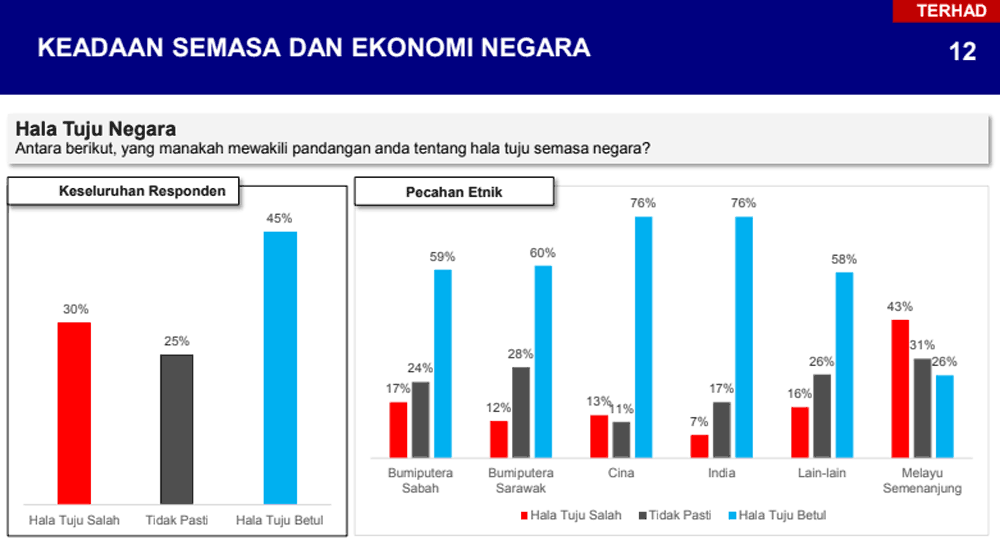The credibility of a major survey commissioned by five media organisations which suggested that the public was generally unhappy with Anwar Ibrahim's administration has come under scrutiny.
In a statement, the head of Universiti Utara Malaysia's (UUM) Malaysian Institute of Political Analysis (Mapan) Mashitah Mohd Udin said the survey was not representative of the electorate.
"There were 35,077 respondents but it only reflected the audiences of the five news organisations.
"Normally, scientific surveys have a high threshold to be considered legitimate - face-to-face or telephone surveys among respondents who are chosen through random stratified samples or, at the very least, simple random sampling encompassing all gender, race, age, economic background, education level, income levels and locality.
"This did not happen for the survey (in question). For example, 81 percent of respondents are males whereas the census shows that 52.3 percent of people in Malaysia are males," she said.
Mashitah said applying a proper sampling technique would also lead to partisans participating in surveys en masse to skew the results.

The survey in question was commissioned by Sinar Harian, Awani, The Star, Sin Chew Daily and Malaysia Nanban in conjunction with Anwar's 100 days as prime minister, which falls on March 4.
The five news organisations published articles based on the survey - conducted by O2 Research Malaysia Sdn Bhd - yesterday.
71 percent of Malays 'not satisfied'
Among others, the survey suggested that 71 percent of Malays were "not satisfied" with the government's effort and ability to fulfil their "GE15 manifesto".
Other ethnic groups were generally more confident in the government to deliver on those promises.
The present government is a coalition of coalitions that did not have a common election pledge. However, a joint "agenda monitoring committee" was formed by the coalitions on Feb 7 to streamline properties - which has yet to be made public.
The survey results paint a negative public perception of the government's handling of political stability, ethnic relations, education, inflation, jobs, wages, natural disasters, economic growth, food supplies, welfare, health and economic resilience.
On the economy, 39 percent of respondents said the situation was getting worse, while 38 percent said it was getting better.
On the current state of the country, 45 percent of respondents said the country was "weak" while 28 percent said it was "strong".
On the direction of the country, 45 percent said the country was moving in the right direction, while 30 percent said it was in the wrong direction.

The survey also suggested that BN supporters do not approve of its decision to be part of Anwar's administration.
"Although the unity government controls two-thirds of the seats in the Dewan Rakyat, it does not reflect the acceptance of the rakyat on the government's performance.
"There is a gap between the sentiment of the people and the unity government," concluded the survey.
Mashitah argued that apart from the need for proper survey methods, it would take time before the people could properly assess the government's performance.
She said the government only started rolling out new policies, such as Malaysia Madani, on Jan 19 while Budget 2023 was only tabled on Feb 24.
"The Sumbangan Tunai Rahmah cash handouts, special grants for Sabah and Sarawak, maintaining the electricity tariffs and interest rates, the strengthening of the ringgit and introduction of Menu Rahmah are among the good policies (introduced recently).
"Government procurement is now transparent, which has resulted in savings. The suspension of flood mitigation projects worth RM15 million and the Jana Wibawa project of RM7 billion which were done without tender before, will be re-tendered for further savings.
"If a survey is done using the correct methodology and using the correct time frame, it would reflect the correct sentiment of the rakyat," Mashitah added. - Mkini

No comments:
Post a Comment
Note: Only a member of this blog may post a comment.